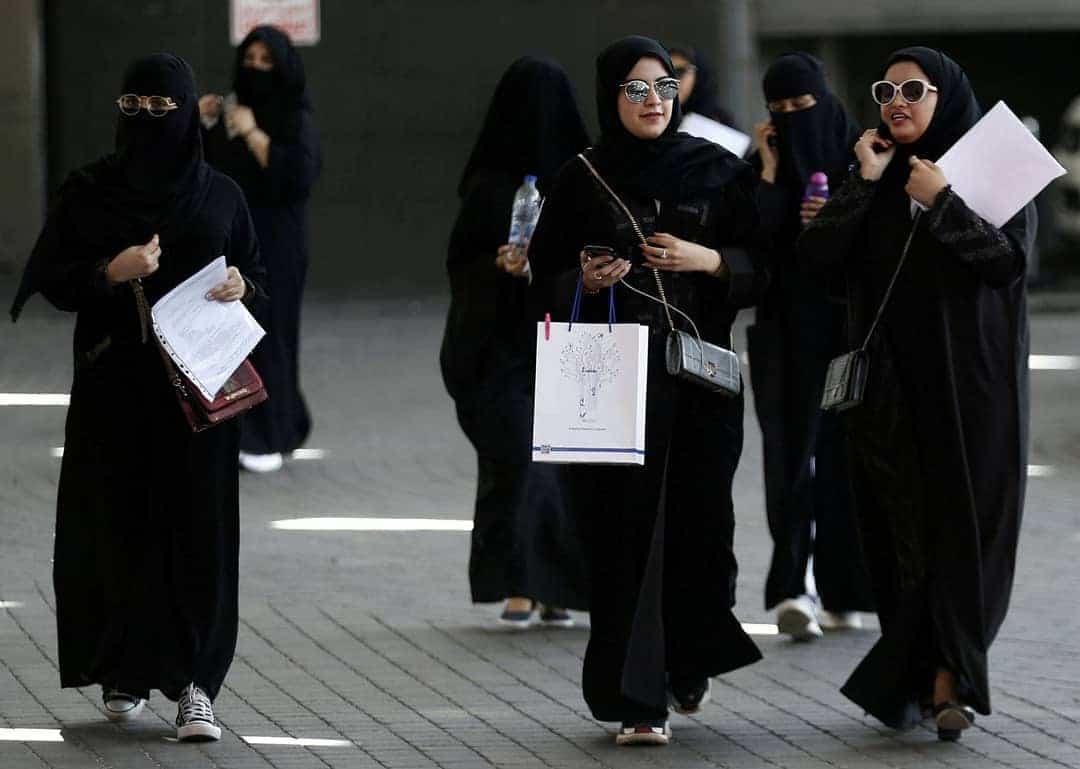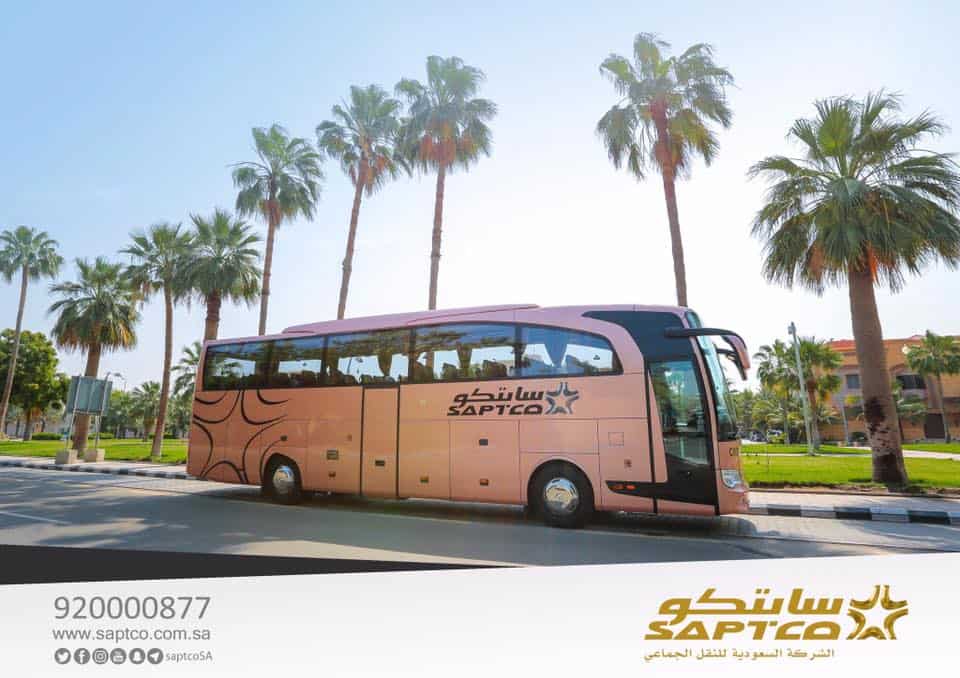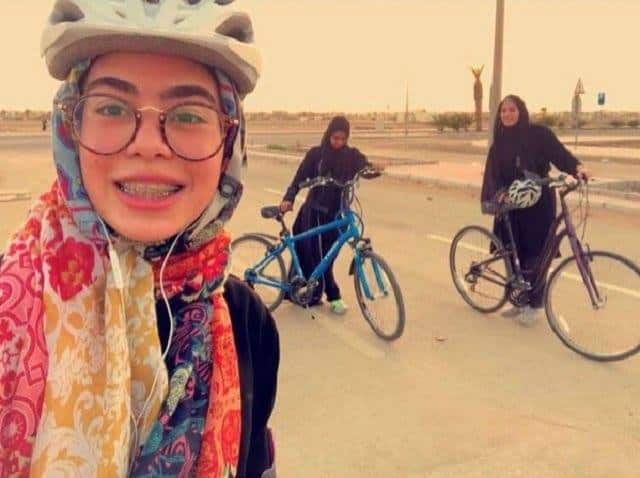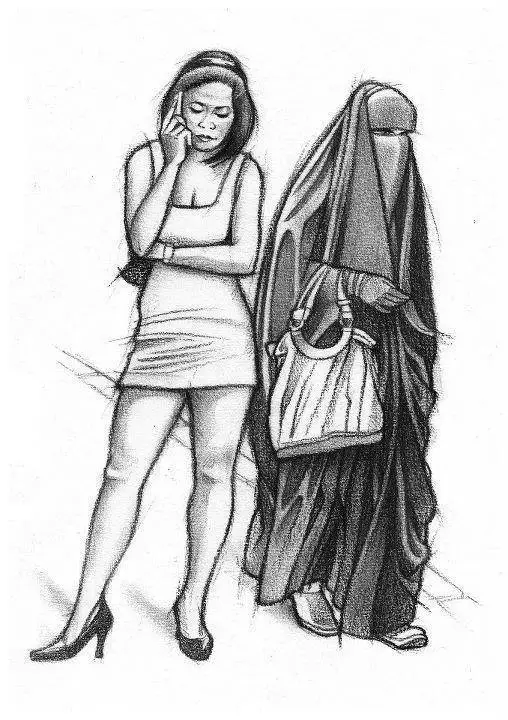Until 2019 and with the introduction of the Saudi Tourist eVisa, I never saw women traveling alone in Saudi Arabia. Today, thankfully, I still don’t see them much.
It’s not that they are not allowed. In fact, the law permits them to do so.
Generally, women don’t travel alone in KSA not because they can’t, but because it is not yet socially acceptable.
Also, most women do not have the stamina nor the confidence to make long journeys without travel companions.
This post will help you decide if it is a good idea for you as a single woman to travel alone in Saudi Arabia. It highlights the current practical issues, social attitudes, and difficulties facing females who choose to.
It also offers some valuable advice for prospective female visitors wishing to go it alone as they travel inside the kingdom.
So, Can Women Travel Alone In Saudi Arabia?
Today, Saudi law permits women to travel alone in Saudi Arabia. They can live or drive alone. They can take planes, trains, buses, taxis and sit alone in restaurants, hotels, and coffee shops. However, outside the major cities, it is both unusual and socially unacceptable, so most still do not.
So women are free to travel alone in Saudi Arabia, but the majority choose not to.
However, in recent years in the larger towns and cities, you will see a number of unaccompanied women walking about the Malls, shopping centers, restaurants, cafés, public areas, etc
Women In Saudi Arabia Prefer Not To Be Alone
The fact is that in social situations, nearly all women in Saudi prefer not to be alone in public.
Most like to hang out with friends, in small groups, or with family members.
Traditional Attitudes About Females Being Alone Persist

Clearly, Islamic and traditional family attitudes persist. People here belong to large tribes and rarely act outside the group.
Additionally, unlike in other Muslim countries, previous generations of Saudi women were not permitted to leave the home alone for work or to attend social events.
However, increasingly more women are learning to drive and are beginning to venture out of the home alone using private cars and taxis.
Today, you will see single female drivers going back and forth to work.
You see unaccompanied housewives driving children to and from school.
You also see single women driving to the Malls, restaurants, and cafés.
For the first time too, I have noticed groups of female friends driving about town together and a lot more women on their own in public areas than I ever witnessed in previous years.
These days, women in Saudi are free to move around and are NO LONGER obliged to be accompanied by male family members or guardians, as was categorically the case in the past.
In spite of these new freedoms, many Saudi females still prefer to be out with family, friends and not to go alone in public.
Females Are Allowed To Travel Alone In Saudi Arabia – So What Else Is Stopping Them?
The Social Obstacles
In Saudi Arabia, social attitudes are not yet in line with the new laws regulating women’s freedom of movement.
Women too are concerned about both the practicalities and safety issues as they move from place to place.
1. Women Are Hesitant About Sharing The Road With Aggressive And ill-Disciplined Male Drivers

The standard of driving in KSA is poor. Women are new to driving and naturally, they fear for their safety.
The new ‘Sahr’ traffic camera monitoring system has greatly improved the impoverished driving standards on Saudi roads, yet men continue to drive very badly.
Their erratic, selfish driving habits have now exposed women to the likelihood of accidents and serious injuries.
For this reason, women oftentimes choose to take taxis or have the family driver chauffeur them when they want to go out.
2. Moving Around- Women Dislike Travelling Alone With Unrelated Men

If a woman is living in a Saudi town or city and does not have her own car, she must rely on public transport.
To move around, she can only get taxis. There are no bus services, no trams or trains.
Of course, the men who drive taxis are not relatives of their female passengers.
In general and for safety’s sake, women and their close family members do not like them to be alone in cars with strange male taxi drivers.
Traditional values concerning gender segregation and Islamic customs continue to prevail in spite of these newly found personal freedoms.
So, women are quite happy to use taxis, but ONLY if they are accompanied by family members or friends.
Today, there are 21 ride-sharing phone applications like Uber with many of them providing increasingly more female drivers.
This is a safer option for women alone on the move than the risk of hailing a standard taxi cab with male drivers.
3. Traveling From City To City-Accidents Make Travelling Alone Imprudent
If women wish to travel alone from one city to another, they can drive, fly by Saudi Airlines or take a bus provided by the Saudi national bus service SAPTCO.
Other than planes, the most common form of ‘city to city’ transport is by car.
And, because of the huge distances between cities, it is not prudent for either men or women to drive alone.
To cover the long distances cheaply and easily, people usually go in small convoys of two or more vehicles.
In this way, the passengers take turns to share the arduous task of driving.
Clearly, women are capable of driving alone for long distances, but are also fearful of having accidents and, like men, do not want to travel alone.
More prudently, they’d rather share the ride with others, since many accidents occur due to over tiredness, poor roads, and driving conditions.
4. The Saudi National Bus Service (SAPTCO) Is NOT For Unaccompanied Women

To get from city to city conveniently, people also use the Saudi national bus service SAPTCO. Riding in their new coaches is cheap (about 25-150 SR one way) and comfortable.
You need only show your passport or Iqama and you can buy a ticket at the bus station to travel to almost any destination in the kingdom.
However, only low-paid single men or frugal families use this bus service. Single women traveling alone usually do not.
When women do choose to use the bus service, drivers like to seat them at the front of the coaches behind the driver’s seat.
It is a way to segregate and protect women from men unless of course, she is traveling with her husband and family.
On long hauls, drivers stop every four hours at a gas station for a break. They usually rest for one hour.
In the past, highway gas stations were filthy, sordid places. Restrooms were old, broken, and dirty and the restaurants offered only cheap sandwiches and boring chicken/ rice dishes.
Stopping at gas stations was necessary, but no fun at all.
Today, new high-end gas stations with fast-food restaurants, coffee shops, and mini-marts are fast appearing along the main highways.
Now, with the improved facilities taking a deserved roadside rest is a far more appealing prospect.
5. Women Travelling Alone In Saudi Arabia Don’t Meet Other Women Along The Way

Only single men use public transport in the kingdom. For this reason, it is almost impossible for female travelers to meet other women because so few women ride alone on coaches.
In Saudi Arabia, although they can move freely in cars in the towns and cities when women travel on planes or buses they are almost always accompanied by their male family members.
This means that if you are a female traveling alone, you will only get to meet and talk to women who are traveling with other men.
For women to meet other women, they need to go to female hangouts such as Malls, cafés, and female-only recreation centers.
6. In Saudi Arabia, Men Ignore Women Travelling Alone

When women travel alone about the kingdom, it is safe to say that men will not harass them.
In fact, most men will politely ignore women who are alone or at the very least keep their conversations with them to a bare minimum. They do this out of courtesy, and also it is an important Islamic norm.
Segregation of boys and girls in schools, colleges, and in most workplaces means that even until today the sexes do not normally mix outside the home.
Men are shy to speak to women and mindful that any unwanted attention might land them in trouble with Saudi authorities.
This attitude is a hangover from the days when the religious police (Mutawaeen) would closely monitor interactions between men and women in public and prosecute those who socialized with non-family members in public spaces.
The liberalizing Saudi government changed all of that in 2016 when it closed down the so-called religious police or Committee for the Promotion of Virtue and the Prevention of Vice (CPVPV) for abuses of power.
Today, no one in authority will approach men to call them out for having improper conversations with unrelated females like in the past.
No one, even the national police, has the right anymore.
The religious police Mutawaeen still exist but they work only to remind others to behave well and to pray on time.
The government has stripped them of ALL of their legal powers.
However, for 50 years the control of the Muatwaeen was so pervasive that even until today men in Saudi deliberately choose to keep their distance from women out of fear of the consequences.
In general, men in Saudi tend to treat unrelated women very well and show them deferential courtesy in the same way they might deal with their own parents.
7. Women Are Free NOT To Wear The Saudi Cloak Abaya But Feel Out Of Place If They Do Not

Today, the law concerning proper dress states that women do not need to wear the long black cloak called the Abaya in public.
However, most women in Saudi Arabia still do.
Women who chose not to, tend to feel very out of place, especially in regional towns and villages where just about every woman wears the traditional clock Abaya and face veil Niqaab.
Note that today, no one will ever approach you to tell you to dress in an Abaya if you are not.
By law, they are no longer allowed to so.
Skimpy Or Revealing Clothes Cause Outrage
However, if in public your clothes are overly revealing or a bit too skimpy, other women and men will speak to you to remind you that your way of dressing is inappropriate and offensive.
When visiting Saudi Arabia, I strongly advise you to come wearing loose-fitting, flowing clothes such as baggy shirts and wide dresses that completely cover your body from the neck down to your toes.
Partial uncovering of parts of the arms, legs, chest, and other body parts is considered as nakedness or ‘Awrah’ in Islam.
Such nakedness is not permitted by law nor is it easily tolerated.
For example, men wearing shorts where the two trouser legs reach above the knees thereby exposing them are no longer permitted to enter Malls and other public places.
For women, conformity to Islamic norms concerning clothing and dress code is especially important.
8. Women Traveling Alone In Saudi Arabia Are Very Safe But Traditional Attitudes Remain

Visitors to Saudi Arabia are very concerned about women’s safety in public. If a woman travels alone in the city or to other cities in taxis, planes or buses she will remain safe.
There are few if any instances of pickpocketing, petty thieving, harassment, threats, intimidation, assault, violence, and rape.
Most Muslim men will never think to take advantage of the fact that a woman is alone nor use it as an invitation to molest and harm her.
However, they might well feel curious and attempt to open friendly relations with an unaccompanied woman with a view to having a romantic encounter.
I doubt though it would ever result in anything sinister.
Women have the highest place in Islam and people understand that their treatment must always be in accordance with the highest Islamic norms.
9. Muslim or non-Muslim-The Treatment Of Lone Female Travelers Is The Same

Non-Muslim colleagues often ask me if I get preferential treatment in Saudi Arabia because I am a westerner living in Saudi and a Muslim.
The answer is that people in Saudi Arabia respect and trust me more because I am Muslim, but treat me as they would anyone else Muslim or otherwise.
The reality is that because I am a Muslim, people expect me to behave better and conform more readily to behavioral norms than they would expect from non-Muslims.
For example, it would not be acceptable for me to smoke, drink alcohol, flirt with women, and treat others casually.
However, people have much more tolerance for non-Muslims who engage in such behaviors understanding that in Western and non-Muslim societies such behaviors are perfectly normal.
10. Non-Muslim Female Travelers Can Share Hotel Rooms And Public Spaces With Non-Family Men

Many women considering a visit to Saudi Arabia have asked me whether they would be allowed to stay in hotels with unrelated men (boyfriends).
The answer is that they can.
A man and a woman traveling together (or in groups) in the kingdom need only show their passports and tourist/visit visas to hotel receptionists, and they can easily get rooms.
Hotel authorities may object personally to the fact that a couple appears to be unmarried, but can not use this as grounds for refusing them access to hotel accommodation or to a tourist facility.
Unlike in the past, the law in Saudi will not tolerate this kind of discrimination of visitors.
Acceptance of unmarried couples will become more commonplace as the new mega tourist attractions open in the next ten years and millions of tourists start arriving in the kingdom.
However, my advice would be to err on the side of caution and not broadcast widely the fact you are unmarried and traveling with someone of the opposite sex.
Related Questions
Can Women Below The Age Of 18 Travel Alone To Saudi Arabia On A Saudi Tourist eVisa? Yes! Women aged 18 and above can get a Tourist eVisa for Saudi Arabia. If under the age of 18, she can come must be accompanied by a guardian family member or an older person.
What Documents Do Women Need To Travel Alone In Saudi Arabia? Visitors to Saudi Arabia should have their passport, a printout of their Tourist eVisa and an address of the hotel (s) where they are staying,
As A Visiting Female How Can I Meet Other Women In Saudi Arabia? Make friends online before you travel. Join Facebook groups, online social organizations, tourist forums, etc., and get to know women BEFORE you arrive in the kingdom. In KSA, you go to Malls, shopping centers, and social recreation centers for women. If you have foreign friends in the kingdom, they will know other women, and you meet them this way.
What Is The Best Way To Dress For Women Traveling Alone In The Kingdom? Unless you pay for access to a private beach where you can dress in a bikini, make sure to dress conservatively. Wear very loose dresses/skirts, baggy trousers and shirts. It is better if you can wear the Saudi cloak (Abaya) and face veil (Niqaab). People will respect you more, you will gain more friends, and will fit in nicely wherever you go in the kingdom.
Are Women Travelers Safe When They Travel Alone In Saudi Arabia? It is very safe for both men and women traveling alone in the kingdom. In fact, you will meet helpful people. Exercise caution and learn to handle any unwanted attention. On the whole, you will feel very safe and will not be in danger.
How Should I Greet Others In Saudi Arabia? People open with ‘Salam Alleykum’ (Peace be upon you) and reply with ‘Wah Ley Kum salam’. (And, Peace Be Upon You Too) Try it! You will delight others and make many new friends.
How Do I Book Accommodation As I Travel From Place to Place? You can use hotel booking sites such as Booking or Agoda! If you reserve a room without paying for it in advance be sure to call the hotel to tell them you are coming and make sure they have a room for you. Sometimes, hotel receptionists ignore reservations and give rooms ONLY to guests who book with prepayments.
What Are The Main Challenges And Difficulties That Women Face Travelling Alone?
Not speaking the Arabic language especially In small towns and villages
The oddness for others of seeing women travel alone
Not meeting other women easily
Segregation of the sexes
Being ignored by local men
Restaurants for men only
Not wearing an Abaya & feeling out of the place
Not wearing Niqaab in regional areas so you stand out
Covering the body except at private beaches
Men cat calling you for being uncovered
Haggling in shops and markets





